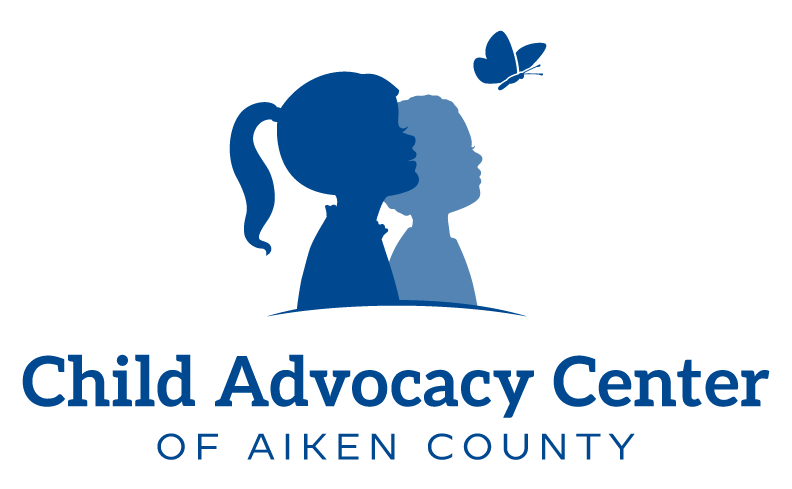Strategies for Preventing Child Sexual Abuse
Those who victimize children are responsible for their actions. As caring adults, there are steps we can each take to minimize risks and keep children safer such as:
- Learn about child sexual abuse, including how to recognize possible signs of abuse and respond to concerns.
- Be prepared to report concerns or suspicions to the Department of Social Services or Law Enforcement. Contact the CAC of Aiken if you have questions or need support to do this.
- Seek information about activities in which children will be involved, including policies and procedures for supervision and safety. Steps should be taken to minimize isolated, one-on-one interactions.
- Talk with adults who will be responsible for caring for or supervising children. Ask about screening, training and monitoring of employees and volunteers.
- Learn about and watch for “grooming” behavior in adults who interact with children.
- Ensure that children and teens know the behavior you expect from them, and the behavior you expect from adults and other youth – including those behaviors that would be concerning, inappropriate or dangerous.
- Talk with children and teens about their bodies, boundaries and sex. Encourage questions and conversation.
- Teach children proper names for all their body parts, including those that are “private.”
- Empower youth to be the “boss” of their bodies. Allow them to choose how they greet or show affection to friends and family members. Do not force children to give hugs or kisses.
- Discourage children from keeping secrets – teach the difference between “secrets” and “surprises.”
- Respect privacy and personal space – encourage independence in toileting, dressing and hygiene.
- Monitor children and teen’s television, video and internet usage/viewing. Exposure to violence or pornography can impact healthy development.
- Participate in Child Abuse Prevention Month events in April. Join us for our next training.
Recommended Websites
Signs and Symptoms of sexual abuse can be present in some but not all cases. Each child is unique and may not show any of the below signs. Please use the following as a guideline:
- Changes in behavior – A victim of abuse could appear scared, anxious, depressed, withdrawn or more aggressive.
- Regression to earlier behaviors – A child may display behaviors shown at earlier ages, such as thumb-sucking, bed-wetting, fear of the dark or strangers. For some children, even loss of acquired language or memory problems may be an issue.
- Fear of going home or to previously trusted places – Children may express apprehension or anxiety about leaving school or about going places with the person who is abusing them.
- Changes in eating – The stress, fear and anxiety caused by abuse can lead to changes in a child’s eating behaviors, which may result in weight gain or loss.
- Changes in sleeping – Abused children may have frequent nightmares or have difficulty falling asleep, and as a result may appear tired or fatigued.
- Changes in school performance and attendance – Abused children may have difficulty concentrating in school or have excessive absences, sometimes due to adults trying to hide the child’s injuries from authorities.
- Lack of personal care or hygiene – Abused and neglected children may appear uncared for. They may present as consistently dirty and have severe body odor, or they may lack sufficient clothing for the weather.
- Risk-taking behaviors – Young people who are being abused may engage in high-risk activities such as using drugs or alcohol or carrying a weapon.
- Inappropriate sexual behaviors – Children who have been sexually abused may exhibit overly sexualized behavior or use explicit sexual language.
- Unexplained Injuries – Visible signs of physical abuse may be present however is extremely uncommon in the majority of sexual abuse incidents.
Reporting Suspected Abuse
Reporting suspected abuse is the most important step you can take to protect our children. If you suspect abuse, call one of the numbers listed on this page. If the child is in immediate danger, CALL 911.
If you suspect child abuse call:
Anywhere in SC call: 888-CARE4US (888-227-3487)
Aiken:
- Department of Social Services, Aiken: (803) 649-1111 (Press 1).
- Aiken County Sheriff’s Office: (803) 642-1761
- Aiken Public Safety: (803) 642-7620
- North Augusta Public Safety: (803) 441-4251
Barnwell:
- Barnwell County Sheriff’s Office: (803) 541-1078
- Department of Social Services, Barnwell: (803) 541-1200 (Press 2)
Edgefield:
- Edgefield County Sheriff’s Office: (803) 637-5337
- of Social Services, Edgefield: (803) 637-4040 (Press 0 for operator)
If you live outside the above listed counties, call the law enforcement agency in your area.
Things to Remember:
DO make sure the child remains in a safe environment
DO NOT try to investigate (see minimal facts interview)
DO NOT confront the abuser
Resource: Download our Minimal Facts Interview
What to Expect
Please use this as a guideline. Every situation is unique and will be treated as the professionals involved deem it necessary in the best interest of the child.
Before you call
When making a report of suspected abuse, be prepared to provide the following information:
- Child’s name, date of birth and address
- Brief description of the child
- Any of the following if relevant: current injuries, medical problems or behavioral problems
- Reason for suspicion
We recognize that you and your children might be feeling anxious and/or overwhelmed as you prepare for your visit to our center. We hope the guides below will help answer some of your or your child’s questions.
If you have any additional concerns, please feel free to contact us at 803-644-5100.
What to Expect – Caregiver’s Guide to a Child Forensic Interview
What to Expect – Caregiver’s Guide to a Medical Evaluation
